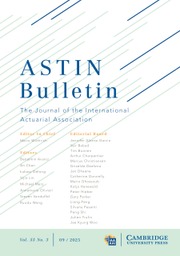Crossref Citations
This article has been cited by the following publications. This list is generated based on data provided by
Crossref.
Koike, Takaaki
and
Hofert, Marius
2020.
Markov Chain Monte Carlo Methods for Estimating Systemic Risk Allocations.
Risks,
Vol. 8,
Issue. 1,
p.
6.
Ji, Liuyan
Tan, Ken Seng
and
Yang, Fan
2021.
Tail dependence and heavy tailedness in extreme risks.
Insurance: Mathematics and Economics,
Vol. 99,
Issue. ,
p.
282.
Chen, Yiqing
White, Toby
and
Yuen, Kam Chuen
2021.
Precise large deviations of aggregate claims with arbitrary dependence between claim sizes and waiting times.
Insurance: Mathematics and Economics,
Vol. 97,
Issue. ,
p.
1.
Liu, Jiajun
and
Yang, Yang
2021.
ASYMPTOTICS FOR SYSTEMIC RISK WITH DEPENDENT HEAVY-TAILED LOSSES.
ASTIN Bulletin,
Vol. 51,
Issue. 2,
p.
571.
Li, Jinzhu
2022.
Asymptotic results on marginal expected shortfalls for dependent risks.
Insurance: Mathematics and Economics,
Vol. 102,
Issue. ,
p.
146.
Li, Jinzhu
2022.
Asymptotic analysis of a dynamic systemic risk measure in a renewal risk model.
Insurance: Mathematics and Economics,
Vol. 107,
Issue. ,
p.
38.
Ling, Chengxiu
and
Liu, Jiajun
2022.
Extremes for a general contagion risk measure.
European Actuarial Journal,
Vol. 12,
Issue. 2,
p.
579.
Yuan, Meng
and
Lu, Dawei
2022.
Precise large deviation for sums of sub-exponential claims with the m-dependent semi-Markov type structure.
Statistics & Probability Letters,
Vol. 185,
Issue. ,
p.
109440.
Li, Jinzhu
2023.
Asymptotic results on tail moment and tail central moment for dependent risks.
Advances in Applied Probability,
Vol. 55,
Issue. 4,
p.
1116.
Pu, Tong
Zhang, Yifei
and
Zhang, Yiying
2024.
On joint marginal expected shortfall and associated contribution risk measures.
Quantitative Finance,
Vol. 24,
Issue. 7,
p.
889.
Chen, Zhangting
and
Cheng, Dongya
2024.
On the Tail Behavior for Randomly Weighted Sums of Dependent Random Variables with its Applications to Risk Measures.
Methodology and Computing in Applied Probability,
Vol. 26,
Issue. 4,
Roozegar, Roohollah
Balakrishnan, Narayanaswamy
Mardani-Fard, Heydar Ali
Desmond, Anthony F.
and
Jamalizadeh, Ahad
2025.
Expressions for Marginal Mean Excess and Marginal Expected Shortfall Measures under Bivariate Scale Mixture of Normal Distribution.
Methodology and Computing in Applied Probability,
Vol. 27,
Issue. 2,
Wen, Limin
Li, Junxue
Pu, Tong
and
Zhang, Yiying
2025.
On multivariate contribution measures of systemic risk with applications in cryptocurrency market.
Probability in the Engineering and Informational Sciences,
p.
1.
Zhang, Yan
and
Wang, Kaiyong
2025.
The asymptotic behavior of tail moments for light-tailed risks with Sarmanov dependence structure.
Statistics & Probability Letters,
Vol. 226,
Issue. ,
p.
110480.
Liu, Jiajun
and
Yi, Qingxin
2025.
Asymptotics for the conditional higher moment coherent risk measure with weak contagion.
ASTIN Bulletin,
Vol. 55,
Issue. 1,
p.
121.
Li, Jinzhu
2025.
The principle of a single big jump from the perspective of tail moment risk measure.
Insurance: Mathematics and Economics,
Vol. 124,
Issue. ,
p.
103118.
Xu, Chenghao
Peng, Jiangyan
and
Zou, Lei
2025.
Asymptotic estimates for systemic risk with dependent heavy-tailed losses.
Lithuanian Mathematical Journal,
Vol. 65,
Issue. 1,
p.
134.

